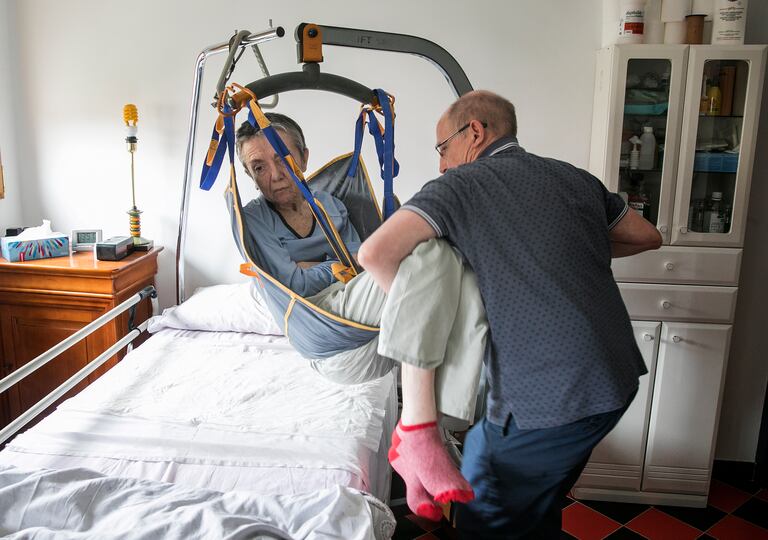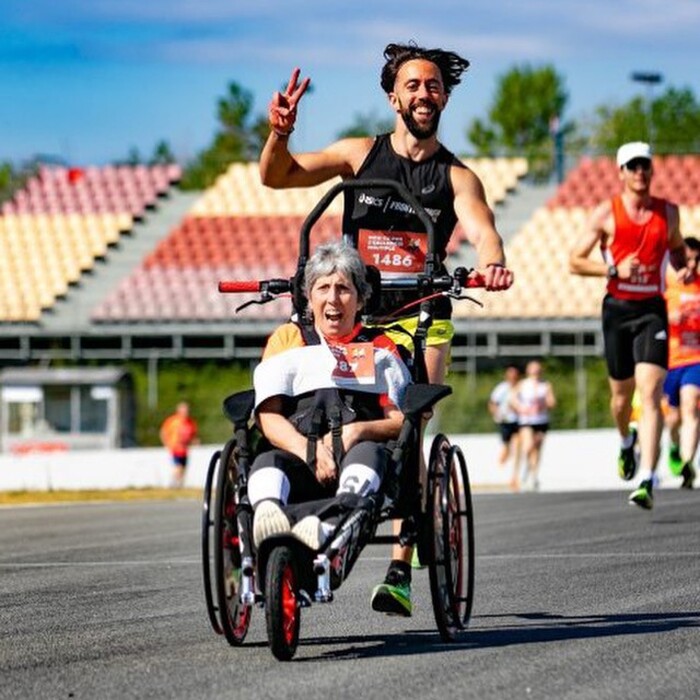María José Carrascosa, a patient with multiple sclerosis, and her husband Ángel Hernández, the first detained in Spain for witnessing a suicide of a relative, in an image from October 2018. Hernández recorded the moment when he provided a lethal cocktail to his wife , to advance the cause of euthanasia.
© Carlos Rosillo .Carlos Rosillo
The idea behind messenger RNA vaccines against covid is so simple that its creators believe that there are no limits of application to other infections and diseases.
His approach is to introduce into the patient a genetic message written in an RNA molecule so that their own cells produce the proteins they need to be immunized.
A few days ago, the team that developed the first effective vaccine against the coronavirus, BioNTech, published a study still in a very early phase that exemplifies the potential of this technique, since they have managed to reverse a disease in animals from which the cause is unknown and for which there is no cure: multiple sclerosis.
Symptoms of this ailment are so varied - from mild tingling in the limbs to almost complete paralysis - that some doctors call it the disease of a thousand faces.
For an unknown reason, the immune system of patients begins to attack their own body, specifically the protective sheath of the nerves, which can cause damage to the central nervous system.
There are patients who can live a lifetime with the disease and suffer only one attack, while others suffer one relapse after another that deteriorates their mobility and predisposes them to suffer cognitive decline.
Every year 2,000 new cases are diagnosed in Spain and this condition is the second cause of acquired disability in young people after traffic accidents, according to the Spanish Society of Neurology.
The mother of BioNTech's vaccine against covid, Katalin Karikó, has just published a study together with the CEO of the company and also scientist Ugur Sahin in which they show that a molecule of messenger RNA can make the immune system of mice that suffer a disease similar to multiple sclerosis learn to tolerate myelin and therefore stop causing damage.
The work, published in
Science
, shows that a treatment based on a modified messenger RNA has been well tolerated by animals.
The injection is essentially very similar to the covid vaccine, but in this case it produces a protein that is capable of modulating the immune system.
The treated mice first showed a stop in the first symptoms and later a reversion of the disease.
In some cases, the vaccine reversed the paralysis the animals suffered.
In addition, researchers have shown that this "vaccine" does not prevent the immune system of animals from identifying other pathogens when they appear, such as the flu.
There are currently more than 10 approved treatments for multiple sclerosis in humans.
These are drugs that modulate the response of the immune system, but have side effects, such as reducing the effectiveness of defenses against other pathogens.
“This is where commercial interests come in and the need to raise money to fund clinical trials.
I think that is not the way things should be done "
Luisa María Villar, coordinator of the Multiple Sclerosis Network
One of the challenges of this disease is that almost every patient has a different type of ailment mediated by different antigens, proteins that cause a reaction of the immune system, in this case autoimmune, as it attacks the body itself.
The work of Karikó, Sahin and the rest of a team in which there are also experts from German universities and hospitals highlights that this type of approach is cheap to produce, which could allow the development of specific messenger RNA molecules for each patient, something that this company and others like Moderna are already trying for patients with different types of cancer.
These types of vaccines could help control "complex autoimmune diseases", the authors of the work conclude.
"It's a very smart approach," says Luisa María Villar, Head of Immunology at the Ramón y Cajal University Hospital in Madrid and a member of the Spanish Society of Neurology.
But this research is still in a very early stage and there is still a lot of research to show that what works in mice can work in humans without causing problems.
“Out of every 100 molecules that are successfully tested in animals, only one ever grows in humans.
Currently there are already other similar approaches that are being tested in humans.
This is just one more and you have to remember that the treatments have improved a lot.
When I started working in this field after 15 years of illness, 50% of patients could end up in a wheelchair.
Now many can lead a normal life ”, explains this immunologist, coordinator of the Spanish Network of Multiple Sclerosis.
"The results are spectacular, even when the disease has already begun to show symptoms"
Fernando de Castro Soubriet, neurobiologist at the CSIC
Villar says that after the publication of this study they have called him patients who "believe that there will be a vaccine in six months."
"It is not like this.
Development is very slow.
In part I think that BioNTech is taking advantage of the pull of its vaccine against covid to promote this other molecule, although it is not yet known if it will achieve anything.
This is where business interests come in and the need to raise money to fund clinical trials.
I think this is not the way to do things.
We will have to show first that this works in humans ”, he highlights.
CSIC neurobiologist Fernando de Castro Soubriet is a specialist in this disease.
The advance seems "very interesting".
“The results are spectacular, even when the disease [experimental autoimmune encephalomyelitis] has already started to show symptoms.
I think that more than a vaccine, this can be interesting as a possible treatment ”, he explains.
Researchers have tested their messenger RNA with another model similar to multiple sclerosis in mice that resembles the type of disease suffered by most patients, characterized by successive seizures and recoveries that can leave damage to the nervous system.
“The work shows that messenger RNA is very effective against this variant in mice.
This type of approach could be very interesting if it shows no side effects, as all available treatments do, and if they are more affordable ”, highlights De Castro Soubriet.
The scientist recalls that some of the most effective treatments today - such as monoclonal antibodies that generate tolerance to myelin - are the most expensive drugs in the world, with a price that can be around 80,000 euros per patient.
You can follow
MATERIA
on
,
,
or subscribe here to our
newsletter
.















